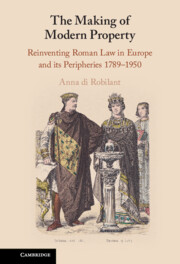
-
Select format
-
- Publisher:
- Cambridge University Press
- Publication date:
- July 2023
- July 2023
- ISBN:
- 9781108859844
- 9781108494779
- Dimensions:
- (229 x 152 mm)
- Weight & Pages:
- 0.69kg, 380 Pages
- Dimensions:
- Weight & Pages:
- Subjects:
- Ancient History, Classical Studies, Law, Comparative Law
You may already have access via personal or institutional login- Subjects:
- Ancient History, Classical Studies, Law, Comparative Law
Book description
In this original intellectual history, Anna di Robilant traces the history of one of the most influential legal, political, and intellectual projects of modernity: the appropriation of Roman property law by liberal nineteenth-century jurists to fit the purposes of modern Europe. Drawing from a wealth of primary sources, many of which have never been translated into English, di Robilant outlines how a broad network of European jurists reinvented the classical Roman concept of property to support the process of modernisation. By placing this intellectual project within its historical context, she shows how changing class relations, economic policies and developing ideologies converged to produce the basis of modern property law. Bringing these developments to the twentieth century, this book demonstrates how this largely fabricated version of Roman property law shaped and continues to shape debates concerning economic growth, sustainability, and democratic participation.
Reviews
‘In this ambitious monograph Anna di Robilant describes how European jurists of the eighteenth and nineteenth centuries drew from the doctrines of Roman classical law and ius commune traditions in order to craft a new ‘Romanist-bourgeois’ form of property.… impressive.’
Joshua Getzler Source: Comparative Legal History
Contents
Metrics
Altmetric attention score
Full text views
Full text views help Loading metrics...
Loading metrics...
* Views captured on Cambridge Core between #date#. This data will be updated every 24 hours.
Usage data cannot currently be displayed.
Accessibility standard: Unknown
Why this information is here
This section outlines the accessibility features of this content - including support for screen readers, full keyboard navigation and high-contrast display options. This may not be relevant for you.
Accessibility Information
Accessibility compliance for the PDF of this book is currently unknown and may be updated in the future.


